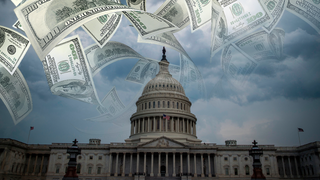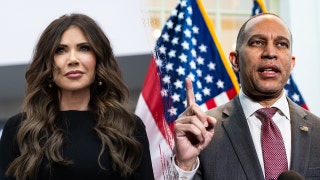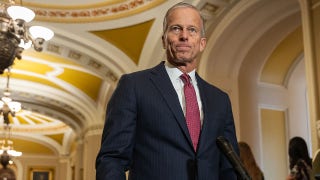WASHINGTON -- Allegations of a pro-gay takeover, boycotts, embezzlement and terrorist-loving board members. Sounds like a Hollywood version of a conspiracy thriller, but it's not.
It's the buzz around this year's Conservative Political Action Conference, the nation's single largest annual congregation of conservative leaders.
Conservatives riding a new wave of momentum thanks to the strength of the Tea Party movement and big wins in the November midterm election should be riding high ahead of this year's CPAC,scheduled to take place in Washington on Feb. 10-13. But the conference, which has met for 38 years, has found itself beset by conflict that even its founder seemed to acknowledge in a recent e-mail with FoxNews.com.
"This year, some have been critical of CPAC because of who will be attending and others because they want others rather than those likely to be featured to speak," said David Keene, the embattled president of the American Conservative Union, which has hosted CPAC every year since 1973
But Keene said the grumbling and positioning is nothing new for a conference whose attendance last year topped a record 10,000.
"The conservative movement is a coalition of men and women who share important core values, but hold widely differing positions on issues they believe to be very important. The bottom line … is that more organizations are participating this year than ever before and if current projections hold, attendance will exceed last year," Keene said.
Still, several high-profile groups, including the Media Research Center, the Family Research Council, Rev. Jerry Falwell's Liberty University and the Heritage Foundation -- giants in the galaxy of conservative activism -- have pulled out this year, following boycott calls by the American Principles Project. APP and the others cited more than anything CPAC's inclusion of GOProud, a pro-gay Republican group that supported the recent repeal of the military's don't ask, don't tell policy, and unlike other social conservative groups or individuals, opposes a federal marriage amendment.
"As more fringe organizations rise in prominence then you start wondering if this is what we want to be associated with as strongly we have," said Heritage spokesman Jim Weidman.
Bryan Fischer, director of issue analysis with the American Family Association, went further, saying CPAC's inclusion of GOProud was a "fatal mistake" for the event writ large. "For us it was a bridge too far. Homosexuality is not a conservative value, period."
All of the groups boycotting CPAC are co-sponsoring October's Values Voter Summit, and actively promoting it as a viable alternative. Sources told FoxNews.com that disgruntled conservatives are also generating interest in building a new conference to serve as a direct competitor to CPAC.
"The fact that CPAC would sell its soul for an extremist organization like GOProud -- it's showing how committed they are to advancing the homosexual agenda," Fischer said. "I think CPAC is committing Hari Kari here, it's suicidal."
GOProud raised the ire of social conservatives in November when in coordination with several Tea Party groups, it sent a letter to the Republican leadership on Capitol Hill saying that they should concentrate on economic policy, and that the recent election was "not a mandate on any social issue."
"When they were out in the Boston Harbor, they weren't arguing about who was gay or who was having an abortion," Ralph King, a Tea Party Patriots national leadership council member, told Politico at the time, referencing the 1773 Tea Party revolt.
GOProud is described as a breakaway group from the pro-gay Log Cabin Republicans, which GOProud Chairman Christopher Barron has said moved too far left for their liking.
"We just felt that they no longer represented the conservative values that we held," Barron said in a recent interview with Right Wing News. On the CPAC boycotts, he said, "personally, I think CPAC is too important of an event for any conservative organization to say that they're not going to participate."
According to sources close to CPAC, the firestorm began in 2009 when GOProud became a CPAC co-sponsor -- a level that typically requires a significant financial investment by the participating organization, though it grants such groups higher status and profile among the hundreds gathering each year at the event.
This year, GOProud is participating at the same level as last year, according to Jimmy LaSalvia, the group's executive director. A vote by the ACU board to bring GOProud on board this year was initially split but in the end the group won out.
LaSalvia and others point out that several boycotters -- like the Family Research Council and the American Family Association -- didn't participate themselves last year, suggesting more may be behind the objections than meets the eye.
Some say boycotting groups might be masking their own fiscal restraints. Others say personal conflicts with organizers that have been long simmering are playing out in the dispute.
"I think there is a broader issue here, to be quite honest. There's been grumbling over the last several years. They say the ACU board, some call it ‘the politburo,' … are old, entrenched conservatives and it's their way or the highway and people are getting a little frustrated," said one conservative strategist who has been close to CPAC for years.
"I think (the social conservatives) have felt alienated for a while, they haven't gotten speaking slots -- that's always a tussle," the strategist said, adding, "David (Keene) has rubbed a lot of people the wrong way over the years."
It doesn't help that in December, World Net Daily, a conservative online news magazine that has emerged as CPAC's fiercest critic, reported that the ACU informed the Internal Revenue Service in November that someone on staff had embezzled organization funds to the tune of $400,000. The ACU has an annual budget of approximately $1.4 million, according to WND. No charges or indictments have been announced so far.
Responding to a question regarding the scandal, Keene told FOXNews.com that "ACU serves as the organizer or facilitator of (CPAC) and while the stories about an employee who stole money from the organization are titillating, they have nothing to do either with the viability of CPAC or the financial health of ACU."
If the controversy over GOProud weren't enough, another complaint gaining traction among right wing blogs is the charge that ACU board member and CPAC organizer Suhail Khan is connected with the Muslim Brotherhood, which is listed as a terrorist organization by the U.S government, and is trying to inject some sort of "Islamic supremacy" into the event.
Critics like Frank Gaffney of the Center for Security Policy, Pamela Geller from the website Atlas Shrugs and Robert Spencer from Jihad Watch are among critics who accuse Americans for Tax Reform chief Grover Norquist, who is also on the CPAC board and an ally of Khan, of being too biased in favor of radical Muslim activists.
They say Norquist and Khan are unduly influencing the CPAC agenda, proving the organization is not serious about the threat of Muslim extremism.
"I have long been aware of the stealth Islamization of CPAC leadership, but held my events there in the hopes that we might snatch back leadership," Geller recently wrote on her website. "David Keene has stacked the board with Islamic supremacists, and their chief diabolical Islamic apologist is none other than the infamous Grover Norquist."
Norquist did not return calls or e-mails for comment, but Khan, a former White House staffer and Republican congressional aide, told FOXNews.com that he is used to the attacks. He said the unsubstantiated accusations against him first emerged after the Sept. 11, 2001, terror attacks when he was working in the Bush White House.
Khan is now a fellow at the Center for Global Engagement working on religious outreach. He said he is the only board member that was elected by the wider ACU membership and enjoys strong support from fellow conservatives.
"The (accusations) are completely false, there is no merit to them," Khan said. "I'm just grateful that the vast majority of conservatives at-large know me as a life-long Reagan conservative who has dedicated his life to individual liberty, limited government and a strong defense. This has not been a controversy internally."
According to CPAC organizers, at least one panel is scheduled on Islamic Sharia law and the debate over its creeping influence in Western societies, including the United States.
Jordan Marks, executive director of the Young Americans for Freedom (YAF), which co-founded CPAC nearly 40 years ago, said when it comes down to it, most young people coming to the three-day event won't be aware -- or care -- about of the infighting and the controversies.
"These are internal issues and a lot of people working in the Beltway tend to get sucked into the Beltway mentality," he said. CPAC will continue "to offer a venue for people to come together and learn, to find the issues that are important to the movement and ... the leaders of the movement are looking to make that personal connection with the activists and foot soldiers. That's what makes CPAC so great."
Meanwhile, Weidman said the Heritage Foundation wants to reach out to fresh voters and the new Tea Party set rather than scuttle around with the "graybeards" and the Washington conservative establishment at CPAC. He acknowledged that the majority of attendees are college students and recent grads, but "they come in through established groups."
"We need to reach the 'regular guys,'" he said. "In other words we're focusing on outreach. In a sense of missionary work, this is where we feel the field being much more fertile, rather than preaching to the choir each year. We've done this one to death."
Craig Shirley, a longtime conservative media strategist with long ties to CPAC, disputed that notion.
"CPAC and the Tea Party were always simpatico. Most of the people who come to CPAC -- if you look at the polling data each year -- the vast majority are from outside Washington. It's the largest gathering of grassroots in the country."
Others say the divide between libertarian and social conservatives has been growing and is quite pronounced at CPAC, which can account for a lot of the rifts today. But this isn't new, either, Shirley said.
"It wouldn't be CPAC if there weren't a fight," said Shirley, who noted similar debates between libertarians and social conservatives in the 1970s.
CPAC "was more fragile 20 years ago than it is now," he said.
And any Republican presidential candidate hoping to get support from the conservative base knows CPAC is a must-do one year before the primaries. According to CPAC, prospective candidates confirmed to speak this year include Mitch Daniels, Haley Barbour, Newt Gingrich, Mitt Romney, John Thune and Tim Pawlenty.
Listed but not confirmed to attend is former vice presidential candidate Sarah Palin. Palin entertained invitations in 2009 and 2010 but declined both years.
Other high-profile conservatives and Tea Party favorites confirmed to speak at CPAC this year include Texas Gov. Rick Perry, Reps. Michele Bachmann of Minnesota and Mike Pence of Indiana, and Sens. Marco Rubio of Florida and Jim DeMint of South Carolina. Guest staples Ann Coulter and Liz Cheney are also on board.
Fischer acknowledged that CPAC will go on -- at least another year -- and that a number of presidential hopefuls will be on hand.
"I would love for them to be asked how they feel about CPAC giving such a prominent role to an organization with such a radical agenda," he said of GOProud. "I think they need to get these (candidates) on record as to whether they are real social conservatives or not."












































